Deputy who sued Toronto Raptors president after altercation was convicted of insurance fraud
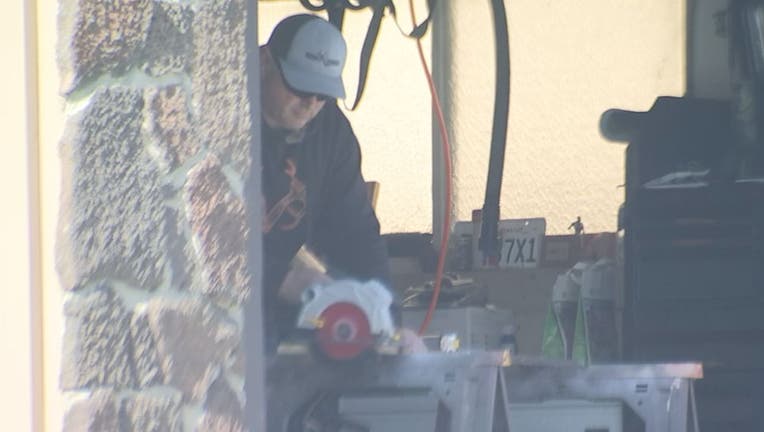
Alan Strickland uses a power saw in his garage. He filed a federal lawsuit against the Toronto Raptors saying he was assaulted and can't return to work. February 2020
SAN MATEO, Calif. - Years before he got into an altercation with a Toronto Raptors executive after the team beat the Golden State Warriors in the NBA finals at Oracle Arena, an Alameda County Sheriff’s deputy was arrested and convicted of insurance fraud.
The revelations raise new questions about the deputy’s integrity, legal experts say, in a case that drew widespread attention and became a glaring distraction amid one of the Bay Area’s most high-profile recent moments in sports.
San Mateo County court records show that Alan Francis Strickland was charged with felony insurance fraud and making false statements on March 31, 1994.
Eleven years later, Strickland ended up pleading no contest to misdemeanor insurance fraud on Dec. 7, 2005, court records show. The false statement charge, a misdemeanor, was dropped in exchange for the no contest plea, which has the same legal effect as pleading guilty.
The fraud charge was discovered when Strickland was applying to be a San Mateo police officer in 2005 - a job he did not get, KTVU learned after reviewing court documents and investigators’ notes at the time.
Last month, Strickland filed a lawsuit in U.S. District Court of Northern California against Raptors president of basketball operations, Masai Ujiri, after the high-profile June 2019 courtside run-in.
According to eyewitness accounts, Ujiri rushed down to congratulate his team after the Raptors beat the Warriors at Oracle Arena in Oakland, and the deputy stopped him because he said Ujiri wasn’t properly showing his credentials. Witness accounts along with some cell phone video show there was a brief, heated altercation between the two men. According to the sheriff’s office, there is also high-definition video taken at the stadium, but it has not been publicly released, despite multiple requests.
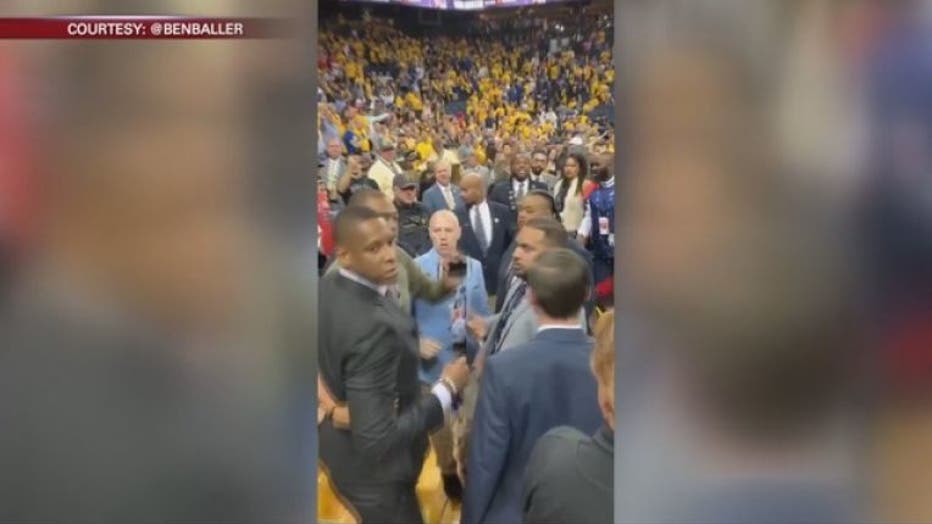
Witness Ben Baller took a photo of the aftermath between Masai Ujiri and the deputy. June 13, 2019
WATCH: Raptors president after he allegedly shoves deputy
No one disputes that Strickland and Ujiri got into a shoving match.
But how hard the shove was is at the heart of the lawsuit.
Strickland, 48, hasn’t returned to work since. His federal suit alleges assault and battery. And he suffered physical injuries to his head, jaw, chin and teeth, according to his claims.
In addition to the lawsuit, Strickland also filed a workers' compensation claim, obtained through a California public records request, alleging Ujiri “circumvented” the security checkpoint and then tried to “storm” the court and “hit him in the face and chest with both fists.”
Strickland also claimed Ujiri had a “violent predisposition” and acted with an “evil motive amounting to malice,” according to his suit and workers' compensation claims.
The Raptors countered the deputy’s claims are “baseless and without merit.” Ujiri told the Globe and Mail last month that the suit was "malicious" especially since no criminal charges were filed against him, and he was sure the "truth will come out."
Despite Strickland’s allegations, the Alameda County District Attorney’s Office last fall declined to file any criminal charges against Uriji, saying the matter would be “better handled in a setting outside the courtroom.”
Strickland and his attorneys, David Mastagni and John Holstedt of Sacramento, have declined to comment after numerous efforts to contact them. Strickland also did not return a message left for him at home.
While the conviction is more than a decade old, three legal analysts told KTVU that the Raptors’ attorneys at the high-profile law firm, Cotchett, Pitre & McCarthy in Burlingame, are sure to use Strickland’s past behavior at some point in their defense. They declined to comment on the case.
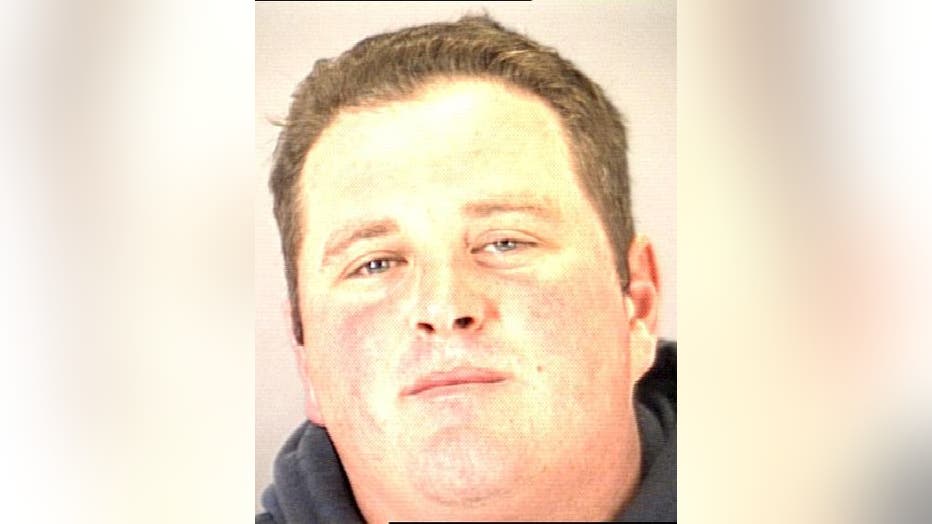
Alan Strickland's booking photo in 2005. He was charged with felony insurance fraud. He pleaded no contest to a misdemeanor. (San Mateo County Sheriff)
Michael Cardoza, who has worked as both a criminal defense attorney and a prosecutor, said it’s not over-reaching to look at the deputy’s past behavior, even if it was so many years ago.
“On a certain level, a lot of people do this type of thing,” Cardoza said. “Like when your car is burglarized, you pump it up a bit because insurance companies try to screw you. So people lie.”
But in this case, Cardoza said that the deputy defrauded an insurance company and this goes to his integrity.
“He’s proven to be a liar, so why should he be believed here when it was a really just a silly shoving match?” Cardoza asked rhetorically. “If I had that information, I’d argue to get it in.”
Strickland’s full criminal court file, along with the supporting documentation, has been purged from the San Mateo County Superior Court system. But six pages of the case still exist, and were reviewed by this news organization.
In addition, San Mateo County District Attorney Steve Wagstaffe provided KTVU a three-line synopsis of the insurance fraud investigator’s notes at the time:
“On Oct. 15, 2005, San Mateo police called the DA’s office to advise Strickland was a candidate for police officer. He admitted to ‘mal mish’ (malicious mischief) (sic) his vehicle in 1994. Apparently he was upset that they raised his premiums due to his not being candid re: mileage so he decided to make that up by slashing his tires and damaging his vehicle.”
The judge in the case, Stephen M. Hall, put Strickland on two years court probation and told him to pay $2,359.23 to State Farm Insurance, as well as another $920 in fines.
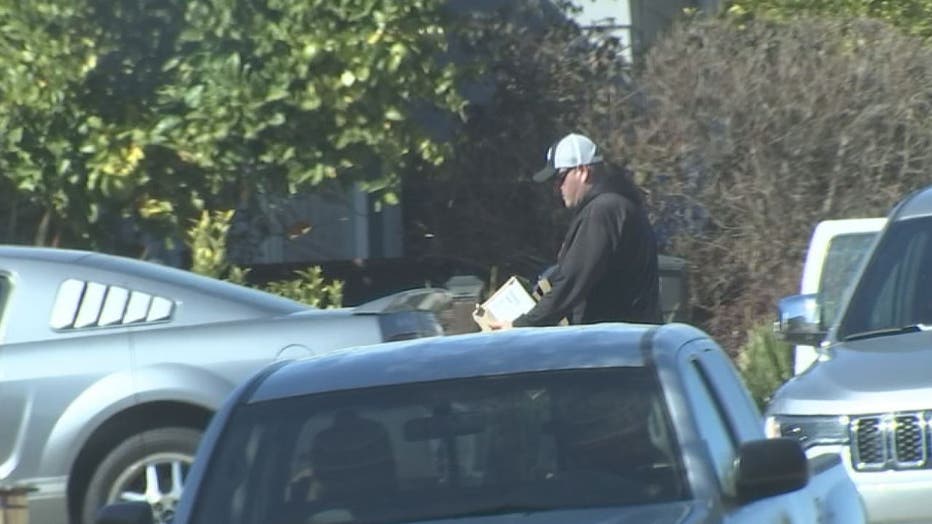
Alameda County Sheriff's deputy Alan Strickland, who is on medical leave, carries boxes to his home. February 2020
People convicted of felonies cannot become police officers. But people may become police officers with certain types of misdemeanors.
Though Strickland did not get the job as a San Mateo police officer, the Alameda County Sheriff’s Office hired him in December 2006, one year after he pleaded no contest to the insurance fraud misdemeanor.
Because the bulk of the paperwork no longer exists, there are many questions left unanswered in Strickland’s past insurance case.
Why did a case that occurred when he was in his 20s take so long to charge? What information did San Mateo police know when Strickland was applying for the job when he was in is 30s? And what are the details of the original insurance fraud case?
Some of those questions might be answered in a San Mateo police report.
But San Mateo police will not release the report to KTVU citing an exemption under the California Public Records Act, which they say allows them to deny to release any documents related to investigations conducted by law enforcement agencies “for correctional, law enforcement, or licensing purposes.”
The city attorney and police department also insist the Strickland case does not have to be made public under SB 1421, a police transparency law that mandates all personnel records be made public if they concern cases that involve police officers lying, sexual assault or shooting someone.
As for when and if Strickland will return to work? The answer is unclear.
According to his suit, Strickland has been “prevented from attending to his usual occupation” and believes that will be the case “for a period of time in the future.”
Strickland alleged he suffered such a “shock of injury to his nervous system” that he believes “will result in some permanent disability.”
In addition to the physical suffering, Strickland also said his “emotional well-being” also took a blow.
“Alan Strickland suffered great anxiety, embarrassment, anger, loss of enjoyment of life, injury to reputation and severe emotional and physical distress to be determined at trial,” according to his suit.
Strickland’s lawsuit does not specifically state he suffered a concussion, though the Mastagni law firm told reporters he did the week of the altercation. During a deposition this summer, he told a county attorney that he takes prescribed medicine at night for headaches.
Over the last 16 years, Strickland has held jobs at Santa Rita and Glenn Dyer jails, and he’s worked at the Eden Township substation and Oakland International Airport, often working as a bomb squad technician. He was providing security and bomb sweeps of the Warriors game on the night in question, Strickland testified during a workers’ compensation hearing. He has filed two workers' compensation claims in the past, he testified. Once, when he said he suffered smoke inhalation while helping evacuate people during the North Bay wildfires, though he acknoweldged he didn't take any time of work, and the second time was when he said he pulled a muscle in his calf slipping on water at the jail.
According to Transparent California, Strickland earned $224,000 a year, not including benefits, in 2018, which is the most recent data provided. He told a county attorney during a deposition during his workers’ compensation hearing that he also typically worked 50 hours in overtime each month.
Over the last several weeks, KTVU crews spotted Strickland using power tools and carrying boxes in his garage. It’s unclear if any of these activities were things he shouldn’t be doing according to doctors and his claim. A silver Mustang with a disabled placard was also seen parked in his driveway.
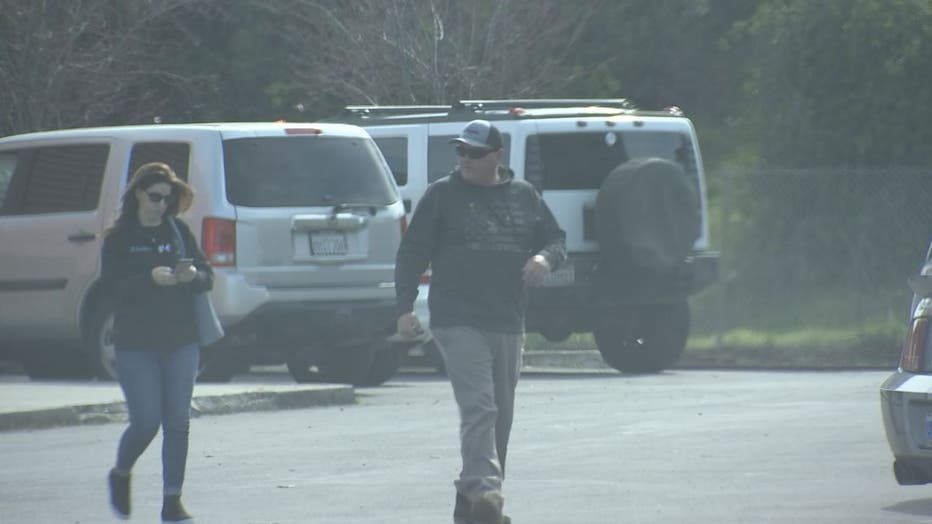
Alan and Kelly Strickland return from having lunch. Kelly Strickland joined the federal lawsuit against the Raptors. February 2020
In testimony during his workers’ compensation claim deposition, Strickland said he used to be a sheet metal worker up until 2005, taking trade school classes at the College of San Mateo.
Kelly Strickland, a stay-at-home mother and Strickland’s wife of 21 years, has also joined the federal suit. She alleges that she will be “deprived of love, companionship, comfort, care, services, assistance, protection, affection, society and moral support, all to her further damage” as a result of what happened to her husband.
KTVU cameras also spotted the couple going out to lunch one afternoon last month.
During the workers’ compensation hearing this fall, attorney Susan Hastings, representing Alameda County, tried asking Strickland about how security is conducted at Warriors games, and how it came to be that Ujiri allegedly struck him.
Yet Strickland’s attorney refused to let the deputy answer the questions, citing “relevance.” Hastings countered by writing the judge to compel Strickland to answer, stating his refusal is something she hasn’t experienced in 25 years. There is a hearing on the matter scheduled for April 6.

Greg Wiener of Alamo saw what he describes as a brief shoving match between the deputy and Masai Ujiri on June 13, 2019
At least one witness at Oracle Arena that night said the shove didn’t look debilitating.
Greg Wiener of Alamo said he was about three feet from the tense situation on the night in question, about 9 p.m. He and his son were leaving the game early, when it was clear the Warriors were going to lose.
A tall man in a suit, who Wiener said wasn’t wearing his credentials around his neck, started walking onto the court.
Wiener said he saw Strickland put his hand out, physically blocking Ujiri from crossing his path.
That’s when Wiener said he saw Ujiri shove the deputy back, putting his hands directly on the officer.
“The gentleman pushed his arm away and the policeman then shoved the gentleman,” Wiener said. “And the gentleman shoved the policeman back. Now, it so happened that the gentleman was Ujiri, the president of the Raptors. But he had his credentials cupped in his hand. Nobody could really see them.”
In his opinion, Wiener said he felt it was wrong for Ujiri to touch a law enforcement officer.
But Wiener also said the incident was very brief and he never saw the deputy fall to the ground or cry out in pain.
“It was a hard shove,” Wiener recounted recently. “But there were no blows, no fists or anything like that. No punches. The whole event took less than 17 seconds. I don’t know how you get a concussion being shoved in the chest.”
- Toronto Raptors president allegedly shoves deputy over credentials
- Sheriff submits Raptors vs. deputy case to DA
- Attorney: Deputy in clash with Raptors exec has concussion, jaw injury and may sue
- Raptors president won't be charged for shoving deputy
- Alameda County sheriff's deputy sues Raptors claiming assault
Lisa Fernandez is a reporter for KTVU. Email Lisa at lisa.fernandez@foxtv.com or call her at 510-874-0139. Or follow her on Twitter @ljfernandez

